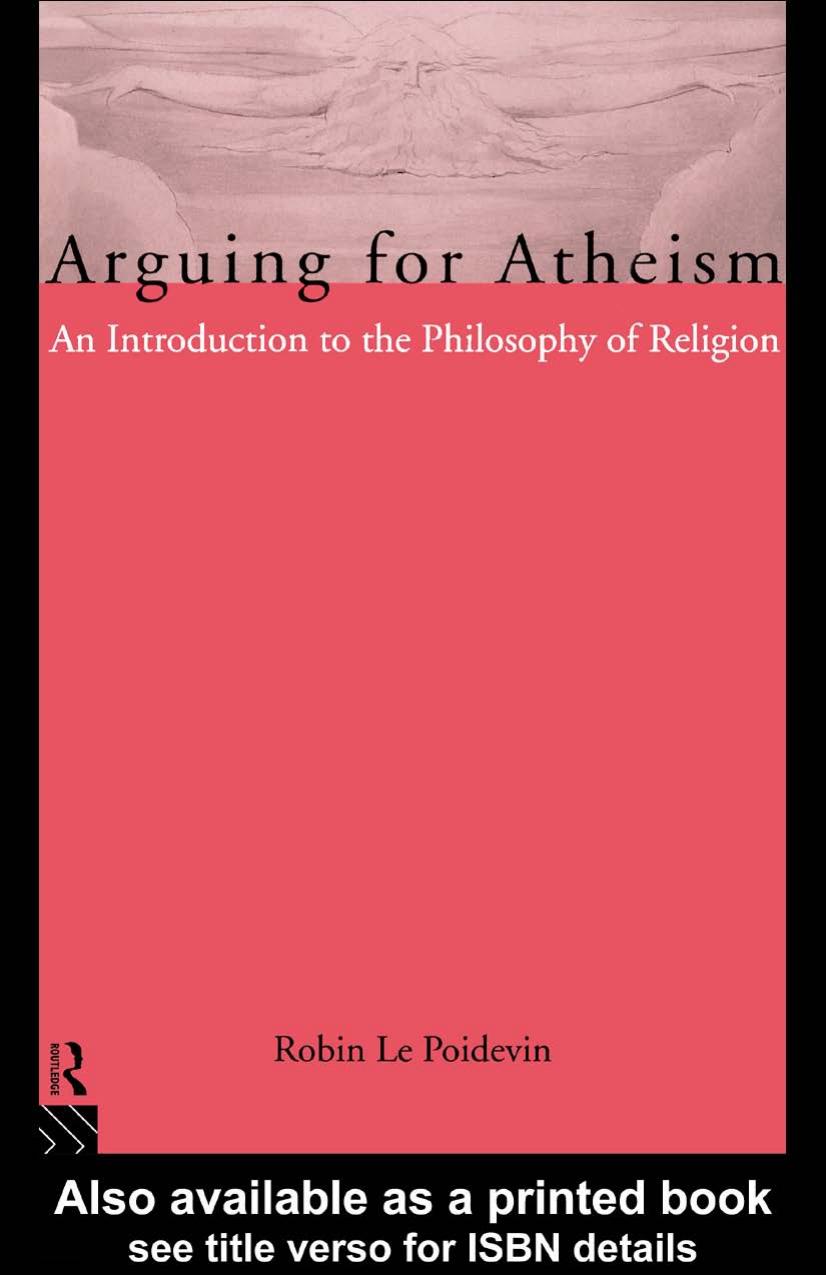Arguing for Atheism: An Introduction to the Philosophy of Religion by Robin Le Poidevin

Author:Robin Le Poidevin [Le Poidevin, Robin]
Language: eng
Format: mobi, pdf
Tags: Humanities
Publisher: Taylor and Francis
Published: 2003-09-01T14:00:00+00:00
Something can be descriptively good, i.e. in our best interests, whether or not God wills it, and so in this sense is good independently of God's will. Of course, if theism is right, even descriptive goodness is not entirely independent of God, since he created things in such a way that doing certain things would be good for us, but that God wills us to do what, as a matter of fact, is good for us does not reduce to the triviality that he wills us to do what he wills us to do. He wills us to do what is descriptively good (i.e. good for us) because he is benevolent: he wants us to do what will enable us to live in harmony with others compatibly with pursuing the goal of self-fulfilment. So what is descriptively good is independent of God's will, in the sense that we do not have to refer to God in defining it, although it may be that God is the causal explanation of why, as a matter of fact, certain things are good for us. However, we can say quite consistently with this that the fact that something is prescriptively good is not independent of, but constituted by, God's will. The additional element of requirement that attaches to morally good actions is provided by God's requiring us to do those things. So he wills us to do what is descriptively good, such as to eat and to refrain from killing each other, but, in addition, places on us an unconditional requirement to perform certain of these descriptively good actions. He does not require us to eat, but he does require us to refrain from killing. The fact that there is a distinctive group of descriptively good actions which are morally valuable does depend directly on God's will. The good, x, is prescriptively good because God requires it, not merely because he wills it. The theist can then present this as God's crucial explanatory role in ethics.
Consider now the assertion that 'God is good'. The meta-ethical argument presents us, in effect, with the following dilemma: either 'God is good' is morally insignificant, or moral goodness is independent of God. Can we employ the descriptive/prescriptive distinction to avoid both horns of this dilemma? Mackie's suggestion is that, when we attribute goodness to God, this is to be understood in purely descriptive terms, that God is disposed to do things which are good for us. It should not be taken as meaning that God does what he is required to do, for, since only God can place this requirement on any agent, it would mean that God requires himself to do what he does, and this has no moral content to it whatsoever. So both Plato's dilemma and the meta-ethical argument can be seen as conflating two distinct senses of 'good'.
Away out of Plato's dilemma and the meta-ethical argument has been provided for the theist. But is it the right way out for the theist to take? I suggest not.
Download
Arguing for Atheism: An Introduction to the Philosophy of Religion by Robin Le Poidevin.pdf
This site does not store any files on its server. We only index and link to content provided by other sites. Please contact the content providers to delete copyright contents if any and email us, we'll remove relevant links or contents immediately.
| Buddhism | Christianity |
| Ethnic & Tribal | General |
| Hinduism | Islam |
| Judaism | New Age, Mythology & Occult |
| Religion, Politics & State |
Cecilia; Or, Memoirs of an Heiress — Volume 1 by Fanny Burney(31355)
Cecilia; Or, Memoirs of an Heiress — Volume 3 by Fanny Burney(30952)
Cecilia; Or, Memoirs of an Heiress — Volume 2 by Fanny Burney(30909)
The Secret History by Donna Tartt(16675)
Sapiens: A Brief History of Humankind by Yuval Noah Harari(13086)
Leonardo da Vinci by Walter Isaacson(11927)
The Radium Girls by Kate Moore(10923)
Sapiens by Yuval Noah Harari(4560)
The Wind in My Hair by Masih Alinejad(4430)
How Democracies Die by Steven Levitsky & Daniel Ziblatt(4427)
Homo Deus: A Brief History of Tomorrow by Yuval Noah Harari(4293)
Endurance: Shackleton's Incredible Voyage by Alfred Lansing(3857)
The Silk Roads by Peter Frankopan(3794)
Man's Search for Meaning by Viktor Frankl(3656)
Millionaire: The Philanderer, Gambler, and Duelist Who Invented Modern Finance by Janet Gleeson(3577)
The Rape of Nanking by Iris Chang(3530)
Hitler in Los Angeles by Steven J. Ross(3450)
The Motorcycle Diaries by Ernesto Che Guevara(3348)
Joan of Arc by Mary Gordon(3272)
